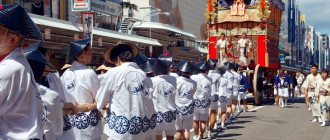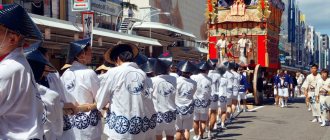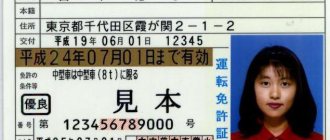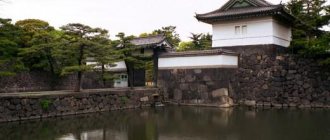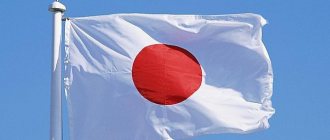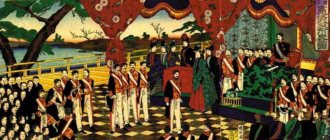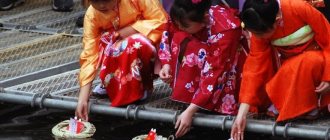The President of Japan, or to be precise, the Emperor, plays a formal function in the country. He represents the state at any meetings or gatherings where there is no need to resolve strategically important state issues. If we compare the Emperor of Japan with the Queen of Britain, we can immediately say: the latter has more powers. In Japan, all power is concentrated in the hands of the prime minister. The imperial chair is passed down through the male line.
The President of Japan is now 83 years old. He received the title of ruler in 1989 and remains so to this day. His name is Akihito.
He's tired, he's leaving
The current emperor ascended the throne on January 7, 1989, following the death of his father, Emperor Hirohito. Tradition assumed that Akihito would remain on the throne until the last days of his life.
However, the current emperor chose to do otherwise. In recent decades, the world's ruling monarchs are increasingly choosing to leave the throne by retiring rather than to the next world.
In August 2021, Akihito shocked his compatriots by announcing in a televised address that he planned to retire in the future, as his advanced age did not allow him to perform full imperial duties.
Akihito era. 10 interesting facts about the Japanese emperor Read more
Family life
After the unanimous approval of Akihito's future wife, the marriage process took place. The family was able to slightly improve the requirements for the imperial alliance. The President of Japan was able to get some obligations canceled. For example, the family raised the children themselves, without resorting to the help of nannies and tutors. And even despite the fact that they were constantly required to go to official events, the guys (at that time they had two children - a boy and a girl) never suffered from a lack of attention.
A new law was needed to renounce
The monarch's intention forced the Japanese parliament and government to work hard. The fact is that until that moment the procedure for the lifetime transfer of imperial power was absent in principle.
On June 9, 2021, the Upper House of the Japanese Diet approved a special bill on the abdication of Emperor Akihito and the transfer of the throne to his eldest son, Crown Prince Naruhito . All 235 deputies present at the meeting voted for the adoption of the document.
Interestingly, the law itself applies exclusively to Akihito, and will not apply to subsequent emperors. Parliamentarians did not begin to amend the Law on the Imperial Household, so that the presence of a provision for resignation there would not become a lever of pressure on the Japanese monarchs.
Crown Prince of Japan Naruhito. Dossier More details
Parliament
Main article: Parliament of Japan
| Japanese Parliament Building | |
| Chambers | |
| Representatives | Advisors |
| (2011) | (2011) |
| “Democratic Party” + non-party “Liberal Democratic Party” “Komeito” “Communist Party” “Social Democratic Party” “Our Party” “New National Party” | |
Status
The highest authority in Japan is the Parliament - the “State Council”. He is the exponent of the will of the Japanese people, the bearer of state sovereignty. Parliament is also the only legislative body of the state. Only he has the right to make laws[2][10].
The Japanese Diet is bicameral. It is formed from the lower House of Representatives and the upper House of Councillors. The first consists of 480 deputies elected for 4 years. It reviews and approves major bills. The second chamber consists of 242 deputies elected for 6 years. It checks bills adopted by the lower house, approves or sends them for revision[2][10].
Members of both chambers are elected by direct vote. The age limit for members of the House of Representatives is 25 years, for the House of Councilors - 35 years. 300 members of the House of Representatives are elected in single-member districts, and the remaining 180 are elected in 11 nationwide multi-member districts. 96 deputies of the House of Councilors are elected in single-member districts, and the remaining one hundred and forty-six in 47 prefectural multi-member districts. Elections are held according to a proportional system[2][10].
The House of Representatives has more powers than the House of Councillors. In particular, the lower house can pass bills with a two-thirds vote of its members if the upper house rejects the bill or does not consider it within 60 days. The decision of the House of Representatives in approving the budget, ratifying treaties and appointing the Prime Minister receives all-parliamentary status when there is no agreement between the two Houses on these issues or the House of Councilors has not made its own decision. The House of Representatives also has the prerogative to express a vote of no confidence in the government[2][10].
Sessions. Dissolution
Sessions of Parliament occur periodically. They are convened by order of the Cabinet of Ministers and opened with the participation of the Emperor. Sessions of Parliament are plenary, temporary and emergency. The plenary session begins every year in mid-January and lasts 150 working days. It can be extended by a joint decision of both Chambers. At plenary sessions, the country's budget for the next year is adopted, and bills are discussed and adopted. A temporary session of Parliament may take place after the end of the regular session, during parliamentary recess, in the event of any political problem arising. Such a session may be convened at the request of the Cabinet of Ministers or at the request of a quarter of the deputies of any of the Chambers. Extraordinary sessions take place as a result of the dissolution of the House of Representatives on the instructions of the prime minister after a vote of no confidence in the government has been expressed. They take place 30 days after the completion of early 40-day elections to the House[2][10].
The House of Representatives can be dissolved by decision of the country's prime minister in the event of confrontation between the government and parliament. The House of Councilors is not subject to dissolution, but ceases to work during early elections to the House of Representatives. In emergency situations occurring during these elections, the Cabinet of Ministers can only convene the House of Councilors to make political decisions. These decisions may lose force if they are not adopted within 10 days after the opening of an emergency session of the newly elected House of Representatives[2][10].
Responsibilities. Passing laws
The duties and prerogatives of the Japanese Parliament include[2][10]:
- adoption of laws, ratification of international treaties, initiation of amendments to the Constitution;
- discussion and approval of the state budget proposed by the Cabinet of Ministers;
- electing a prime minister from among the deputies of Parliament, expressing a vote of no confidence in the Cabinet of Ministers, checking the public administration carried out by the Cabinet of Ministers;
- adoption of impeachment of judges who committed violations during the execution of legal proceedings.
The process of passing laws in Parliament is as follows. First, deputies of Parliament or the Cabinet of Ministers submit a bill to the chairman of one of the Chambers. Having familiarized himself with it, the head passes the bill to the relevant committees, in which deputies carry out an examination of the document. In special cases, in addition to the examination, public hearings are held, in which scientists and specialists who are not members of Parliament, but who have deeper knowledge of the subject than deputies, are involved. If the bill is approved by the committees, it is sent for adoption at a parliamentary meeting. After the document is adopted by one Chamber, it is transferred to the chairman of the other Chamber. In this chamber the bill goes through the same stages of consideration as in the previous one. In case of disapproval, the document is discussed at a joint meeting of both Chambers. If a bill approved by the House of Representatives is rejected by the House of Councilors, the House of Councilors can grant it the status of law by re-adopting it with a two-thirds vote. The new law is transmitted by the heads of the Chambers through the Cabinet of Ministers, which informs the Emperor about it. The latter must announce it within 30 days from the date of notification[2][10].
The country went on a 10-day vacation
It took several more months to determine the exact date of Akihito's retirement. As a result, in December 2021, the Government of Japan decided that the emperor would leave the throne on April 30, 2021. This decision was made during a meeting of the commission on issues of the imperial family, convened for the first time in 25 years. The day of accession to the throne of the new monarch was determined to be May 1, 2021.
This is such an important moment for Japan that the authorities have declared a holiday in the country from April 27 to May 7. These days, almost all government agencies, as well as most enterprises, are closed. Economists warned that such a long period of downtime could have a negative impact on the country’s situation, and almost half of the population, according to surveys, is not happy with the long vacation that has fallen on citizens. But respect for traditions in Japan turned out to be stronger than sober economic calculations.
Hirohito's hard day. How the Emperor of Japan became a man Read more
Courts
Main article: Supreme Court of Japan
Supreme Court of Japan.
Courts are the judicial authorities in Japan. They exist to oversee the implementation of laws and resolve conflicts in accordance with current legislation. The Japanese judiciary is independent of the executive and legislative branches. This is a necessary condition for a fair trial. The courts are headed by independent judges, who are guided only by the Constitution, laws and their own conscience when resolving cases. One of the main prerogatives of the judiciary is constitutional review - checking the conformity of laws passed by Parliament and regulations issued by the government with the current Constitution of Japan. Therefore, the courts are called “constitutional sentries”[2][14].
Japanese courts are divided into the Supreme Court of Japan and lower courts. The latter consist of higher, district, family and disciplinary courts. The Supreme Court is the highest judicial authority in the country. It has the right of constitutional control and acts as a court of last resort, whose decisions are not subject to appeal. The Supreme Court is composed of a chairman and 14 judges, who are nominated by the Cabinet of Ministers and appointed by the Emperor. Judges of lower courts are appointed by the Cabinet of Ministers[2][14].
Legal proceedings are divided into civil and criminal. It is carried out on the basis of the “Six Codes” - a collection of all the main laws of Japan[2][14].
Civil courts consider conflicts regarding finance, real estate, trade transactions, transportation, compensation, etc. Typically, civil cases are conducted with the participation of lawyers for the plaintiff and the defendant. If the parties do not agree with the court's decision, it has the right to use force to implement its decision[2][14].
Criminal courts hear cases involving murder, robbery, hooliganism and other anti-social crimes. On the side of the victim, the prosecutor acts as a prosecutor; on the side of the suspect, a lawyer acts as a defender. All suspects have a presumption of innocence until proven guilty in court. Depending on the results of the trial, the judge issues an appropriate sentence[14].
As a rule, all court hearings are open to the public. However, by unanimous decision of the judges leading the trial, the hearing can be held behind closed doors. If a party participating in the trial was not satisfied with the court's decision, it can file an appeal to a higher court, and then to the Supreme Court[14].
From May 1 - a new era
In his last days, Akihito underwent a rather lengthy ritual of renunciation, which included visits to various sacred places associated with imperial power. A total of 11 such rituals were performed. The culmination of the ceremonies on April 30 was a visit to three shrines on the territory of the palace complex, dedicated to Shinto deities, ancestor emperors and the Sun Goddess Amaterasu, from whom, according to legend, the imperial dynasty in Japan originated.
The resignation process ends with a civil ceremony attended by about 300 of Japan's most influential officials and politicians.
Akihito will remain emperor until the last minute on April 30, 2021. On May 1, Crown Prince Naruhito becomes monarch, and this day will become the 1st day of the 1st year of the Reiwa era ("Beautiful Harmony").
Imperial Family of Japan
Akihito is the reigning Emperor of Japan. Last year, the Imperial Household Administration released an extraordinary personal video message from the emperor, in which he announced his intention to abdicate the throne. www.globallookpress.com
Young Akihito with his father Hirohito, Emperor Showa. Public Domain
Akihito's wife is Empress Michiko, née Michiko Shoda. www.globallookpress.com
They met their future husband on the tennis court. This violated a centuries-old tradition requiring members of the imperial family to choose wives exclusively of aristocratic origin. Despite this, the choice of the Crown Prince was approved by all members of the Imperial Household Council. Public Domain
Akihito has a brother - Masahito, Prince of Hitahi. He is the fifth child in the family of Emperor Hirohito. Married to Hitachi Hanako, the couple has no children. Hirohito's other five daughters lost their noble titles after marriage. www.globallookpress.com
Akihito and Michiko have three children. The eldest son, Crown Prince Naruhito, is married to Masako Owada, who worked as a diplomat in the Japanese Ministry of Foreign Affairs under the leadership of his father Hisashi Owada, who became a judge at the International Court of Justice in 2002, and was previously the Vice Minister of Foreign Affairs and Japan's Ambassador to the UN. www.globallookpress.com
The couple's only child, Aiko, Princess Toshi (left), was born on December 1, 2001. www.globallookpress.com
Prince Akishino (Fumihito), the youngest son of Emperor Akihito and Empress Michiko, is second in line to the Chrysanthemum Throne. He is married to Kiko Kawashima, the daughter of an economics professor at Gakushuin University. www.globallookpress.com
Prince and Princess Akishino have two daughters and one son. In the photo (from left to right): the youngest daughter, Princess Kako, and the eldest daughter, Princess Mako, with their parents. www.globallookpress.com
The youngest member of the imperial family at present, Prince Hisahito, is the direct contender for the throne and will ultimately succeed him unless Hisahito's uncle, Crown Prince Naruhito, produces a male heir or unless the succession laws change. Commons.wikimedia.org / Ministry of Foreign Affairs of Japan
Human rights[ | ]
Anti-nuclear demonstration in defense of the right to preserve the environment. Basic human rights are guaranteed by the Japanese Constitution. They are defined as eternal and unshakable. These rights include the right to equality, freedom, social rights, and protection of fundamental human rights. The Constitution allows human rights to be limited if they violate the common welfare or the rights of others[2].
The right of Japanese citizens to equality before the law applies regardless of their socioeconomic status, political or religious beliefs, gender or race. This right prohibits discrimination against Japanese citizens based on the above criteria. The right to freedom guarantees the physical, spiritual and economic freedom of a citizen. He can freely choose his faith, education, occupation, place of residence, etc. Slavery, torture, and illegal imprisonment are prohibited. Social rights guarantee citizens the satisfaction of minimal housing, cultural and health needs, determine the freeness of compulsory education and recognize the human right to work, protection from unemployment and exploitation. To protect their basic rights, Japanese citizens have additional rights to participate in political life through elections, the right to government assistance and compensation.[2]
Among the new rights that define the latest Japanese legislation are the right to proper maintenance of the environment, the right to information, and the right to confidentiality and protection of privacy[3].
According to Amnesty International in 2011, Japan generally adheres to basic human rights. However, there are cases of discrimination against women, foreigners, and illegitimate children; sexual harassment at work (see also Discrimination in Japan); excessive exploitation of workers; bullying of children in educational institutions; non-compliance with the rights of prisoners[4][5]. The country was ranked 20th in the 2021 Corruption Perceptions Index.
Imperial Family of Japan
Akihito is the reigning Emperor of Japan. Last year, the Imperial Household Administration released an extraordinary personal video message from the emperor, in which he announced his intention to abdicate the throne. www.globallookpress.com
Young Akihito with his father Hirohito, Emperor Showa. Public Domain
Akihito's wife is Empress Michiko, née Michiko Shoda. www.globallookpress.com
They met their future husband on the tennis court. This violated a centuries-old tradition requiring members of the imperial family to choose wives exclusively of aristocratic origin. Despite this, the choice of the Crown Prince was approved by all members of the Imperial Household Council. Public Domain
Akihito has a brother - Masahito, Prince of Hitahi. He is the fifth child in the family of Emperor Hirohito. Married to Hitachi Hanako, the couple has no children. Hirohito's other five daughters lost their noble titles after marriage. www.globallookpress.com
Akihito and Michiko have three children. The eldest son, Crown Prince Naruhito, is married to Masako Owada, who worked as a diplomat in the Japanese Ministry of Foreign Affairs under the leadership of his father Hisashi Owada, who became a judge at the International Court of Justice in 2002, and was previously the Vice Minister of Foreign Affairs and Japan's Ambassador to the UN. www.globallookpress.com
The couple's only child, Aiko, Princess Toshi (left), was born on December 1, 2001. www.globallookpress.com
Prince Akishino (Fumihito), the youngest son of Emperor Akihito and Empress Michiko, is second in line to the Chrysanthemum Throne. He is married to Kiko Kawashima, the daughter of an economics professor at Gakushuin University. www.globallookpress.com
Prince and Princess Akishino have two daughters and one son. In the photo (from left to right): the youngest daughter, Princess Kako, and the eldest daughter, Princess Mako, with their parents. www.globallookpress.com
The youngest member of the imperial family at present, Prince Hisahito, is the direct contender for the throne and will ultimately succeed him unless Hisahito's uncle, Crown Prince Naruhito, produces a male heir or unless the succession laws change. Commons.wikimedia.org / Ministry of Foreign Affairs of Japan
Political life
Elections
Propaganda campaign 2005.
Bus of Akihisa Nagashima, Democratic Party of Japan candidate Japan is a country with a representative democracy. Citizens participate in governing the country by electing their representatives as heads of municipalities, deputies of local councils or Parliament. In this regard, the elections of these representatives are the most important in the internal political life of Japan. Elections are held in compliance with the principles of universal, equal, direct and secret voting. All Japanese citizens over 20 years of age have the right to vote. The age limit for deputies of the House of Representatives, regional councils or heads of municipalities is 25 years; for deputies of the House of Councilors and heads of prefectures - 35 years [6].
Elections take place in constituencies. They are divided into large and small. Large districts are multi-member districts, in which deputies are elected to Parliament within the framework of a proportional system, according to the so-called party lists. The barrier to entry into parliament is 2%[7]. Small districts are single-mandate, where deputies of Parliament and local councils are elected under a majoritarian system [6]. Elections must take place 30 days after they are announced. The duration of the parliamentary election campaign is 17 days, others - from 5 to 17 days[6].
Political parties
Main article: Political parties of Japan
The main participants in Japanese political life, which determine the strategy and tactics of the country's development, are political parties. They offer citizens programs for the development of Japan, for the implementation of which they try to gain support in elections and take part in governing the country. The main seats in Parliament and local councils are occupied by representatives of these parties. They form the Japanese central and local governments. The party with the majority in Parliament has the right to head the Cabinet of Ministers. It is called the ruling one, and its Cabinet is called the party Cabinet. Smaller parliamentary parties may form a coalition with the ruling party or act as an opposition criticizing the ruling party.
In post-war Japan, despite the existence of a multi-party system, a two-party parliamentary system prevails. For almost the entire second half of the 20th century, the country was led by the center-right Liberal Democratic Party, in opposition to which was the social liberal Democratic Party. At the beginning of the 21st century, the two parties switched roles. As of 2018, the Liberal Democrats are in power and the Democrats are in opposition. The leader of the Liberal Democratic Party, Yoshihide Suga, serves as the country's prime minister. Other political parties that have a minority presence in the Japanese Diet are the Komeito, Social Democratic and Communist parties. Depending on their interests, they periodically form a coalition with the ruling parties or act in opposition[6].
"Emperor at rest"
In Japanese tradition, the deceased emperor is assigned in history not his name, but the name of the era. Thus, Akihito would later be referred to as the Heisei Emperor.
From now on, he will be given the new title of “daijo tenno,” which means “retired emperor.” Akihito will retain all privileges and state support, and after his death he will be buried in compliance with all imperial ceremonies.
As for the new emperor, many events await him related to his accession to the throne. For example, on October 22, Sokui Reiseiden no Gi will take place - the ceremony of the official announcement of accession to the throne. The heads of 195 states of the world with which Japan has diplomatic relations are invited to this ceremony.
Ritual of the abdication of Japanese Emperor Akihito from the throne
Emperor of Japan Akihito goes to the ritual. Reuters
Emperor Akihito of Japan, surrounded by officials of the Imperial Agency. Reuters
The last day of the Heisei era. Reuters
The last day of the Heisei era. Reuters
Crown Princess Masako of Japan arrives at the Imperial Palace. Reuters
The Crown Princess of Japan arrives at the Imperial Palace. Reuters
Crown Prince of Japan Naruhito. Reuters
Imperial shrines in the Imperial Palace. Reuters
Japanese Prince Hisahito. Reuters
Emperor Akihito of Japan and Empress Michika. Reuters
Emperor of Japan Akihito. Reuters
Emperor Akihito of Japan and Empress Michiko. Reuters
Crown Prince Naruhito of Japan and Crown Princess Masako. Reuters
The last day of the Heisei era. Reuters
Ritual of the abdication of Japanese Emperor Akihito from the throne
Emperor of Japan Akihito goes to the ritual. Reuters
Emperor Akihito of Japan, surrounded by officials of the Imperial Agency. Reuters
The last day of the Heisei era. Reuters
The last day of the Heisei era. Reuters
Crown Princess Masako of Japan arrives at the Imperial Palace. Reuters
The Crown Princess of Japan arrives at the Imperial Palace. Reuters
Crown Prince of Japan Naruhito. Reuters
Imperial shrines in the Imperial Palace. Reuters
Japanese Prince Hisahito. Reuters
Emperor Akihito of Japan and Empress Michika. Reuters
Emperor of Japan Akihito. Reuters
Emperor Akihito of Japan and Empress Michiko. Reuters
Crown Prince Naruhito of Japan and Crown Princess Masako. Reuters
The last day of the Heisei era. Reuters
Heirs to the throne
The new Emperor of Japan, Naruhito, is 59 years old, he has a master's degree in history, plays the viola in his free time, loves to jog, and was fond of mountaineering in his youth. Naruhito has no sons, so his younger brother, 53-year-old Prince Akishino, .
From 1965 to 2006, no boys were born into the imperial family, as a result of which the Japanese authorities even thought about the possibility of a woman appearing on the imperial throne. But on September 6, 2006, a boy was born into the Akishino family, who was named Hisahito.
Hisahito, now 12 years old, will take second place to the throne from May 1, just behind his father.

